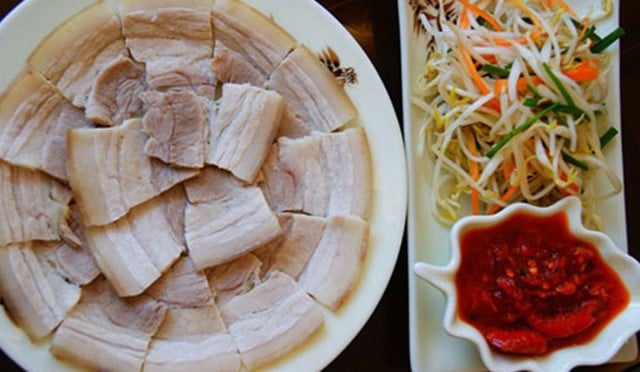What happens to your body if you eat pork properly?
Pork is the most popular meat in the world . In Vietnam, pork appears in many family meals because it is delicious, affordable for many people and easy to prepare. However, it is also one of the most controversial foods in terms of its health benefits and harms.
According to American nutritionists, 100 grams of pork contains 297 calories, 25.7 grams of protein, 20.8 grams of fat, 0 grams of carbs, fiber and sugar, and is also a good source of protein and vitamins B6 and B12.

Illustration
Pork is also a good source of vitamins and minerals such as phosphorus, selenium and thiamine. Thiamine is a B vitamin that is needed for a variety of body functions. It is much higher in pork than in beef.
Vitamins B6 and B12 are also found in abundance in pork. These vitamins are essential for blood cell formation and brain function. Pork is also an excellent source of iron.
Selenium in pork helps the thyroid function properly. A 170 gram piece of pork has more than 100% of the recommended daily intake of selenium.
Other studies have also shown that pork has many other benefits. Specifically, the high-quality proteins in pork are complete amino acids used to build new muscle. Eating pork will help prevent muscle loss and severe muscle degeneration.
However, consuming too much and regularly pork will pose many health risks.
6 diseases 'lurking' if you eat too much pork
Cardiovascular disease
Pork, especially fatty cuts like skin, bacon, and organs, contain significant amounts of cholesterol and saturated fat. When you eat too much fatty pork, the amount of bad cholesterol (LDL) in your blood can increase, build up on the walls of your arteries, and form plaques. These plaques narrow your arteries, restrict blood flow, and increase your blood pressure. If left unchecked, this condition can lead to serious complications such as heart attack, stroke, and other cardiovascular diseases.

Illustration
Diabetes
A diet high in meat, especially meats with a lot of fat, increases fatty acids and triglycerides - the cause of type II diabetes. Because excess fatty acids in the blood and triglycerides inhibit the action of insulin, this leads to normal or slightly increased insulin levels in the blood test results but the patient's blood sugar is in a state of high. If this mistake is corrected by switching to a vegetarian diet, blood sugar levels will decrease significantly and fatty acid levels will return to a safe level.
Kidney disease
Many studies show that in order to excrete toxic nitrogen compounds from eating a lot of meat, the kidneys have to work three times harder than the kidneys of vegetarians. Urea and uric acid are two waste products of a meat diet that are very toxic to the body. When we are young, our kidneys are still healthy, so we can still excrete these substances, but when we are old, our kidneys are weakened, the job of excreting these substances becomes a burden for the kidneys and as a result, the kidneys cannot detoxify effectively, which inevitably leads to illness.
Gout
When the kidneys are not able to filter out all the toxic nitrogenous substances, creatinine and uric acid increase in the blood. The increased uric acid concentration will deposit in small joints such as the finger and toe joints, causing gout. In the joints, uric acid deposits and crystallizes into crystals, creating an inflammatory reaction, causing a lot of pain for the patient.
Liver disease
The function of the liver is to synthesize substances necessary for the body and eliminate toxic substances. However, a diet high in meat and animal fat will overwork the liver and cause damage. Eating meat and fat will cause the liver to become fatty, fibrotic, and scarred.
Obesity
The main cause of obesity is a diet with too much excess calories such as animal fat, butter, cheese, meat, chocolate, flour, sugar... When obese, people are lazy to exercise, so the excess energy is not consumed but stored as fat, making them even fatter. Obesity will lead to atherosclerosis, high blood pressure, and bone and joint pain.
4 things to know when eating pork for best health

Illustration
Control meat intake
Dietary guidelines recommend limiting daily meat and poultry consumption, including pork, to 40-75g. If you like to eat animal liver, including pork liver, you can eat 2-3 times a month, 25g/time.
Pay attention to cooking methods
People should limit grilling, roasting, and frying meat. Use low-temperature cooking methods, which not only ensure food safety but also retain more nutrients.
Combine meat and vegetables
When preparing dishes with pork, you should combine them with vegetables rich in vitamin C such as cabbage, bell peppers, bitter melon, etc. This will help you promote iron absorption, balance nutrition, and avoid eating too much pork.
Limit processed pork
Processed products such as bacon, cold cuts, and sausages not only contain high levels of salt, but during the production process they also produce many types of carcinogens such as polycyclic aromatic hydrocarbons, nitrosamines, etc. The nutritional value of pork when cooked as above is also reduced.
Source: https://giadinh.suckhoedoisong.vn/ai-hay-an-thit-lon-can-biet-dieu-nay-de-phong-benh-tieu-duong-tim-mach-va-benh-ve-gan-than-172240922163050192.htm




















































![[Maritime News] More than 80% of global container shipping capacity is in the hands of MSC and major shipping alliances](https://vphoto.vietnam.vn/thumb/402x226/vietnam/resource/IMAGE/2025/7/16/6b4d586c984b4cbf8c5680352b9eaeb0)













































Comment (0)